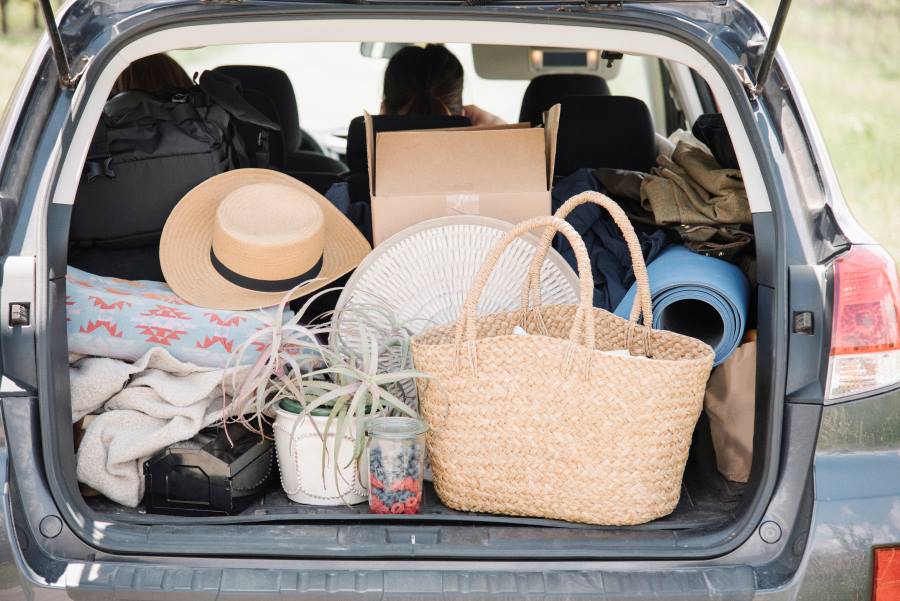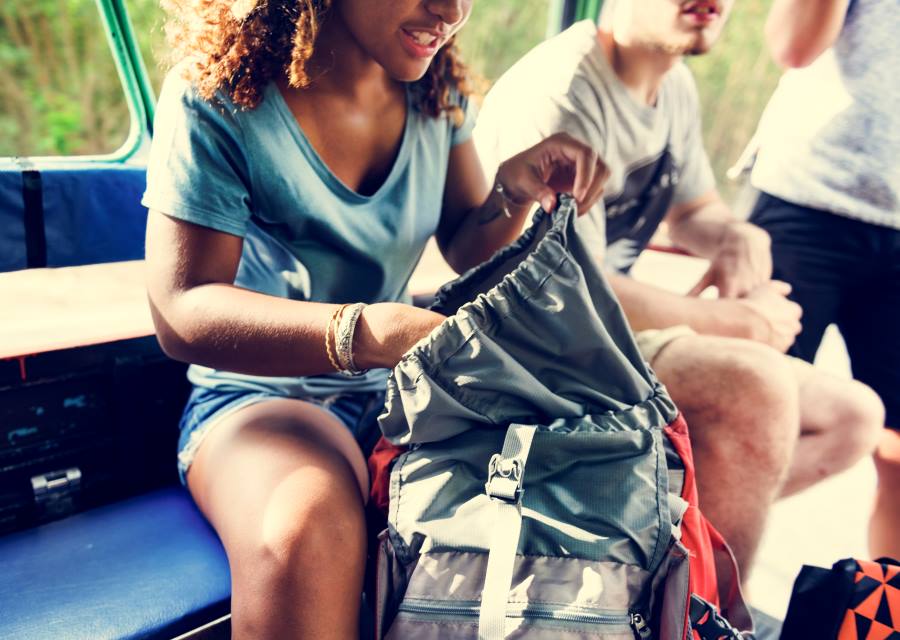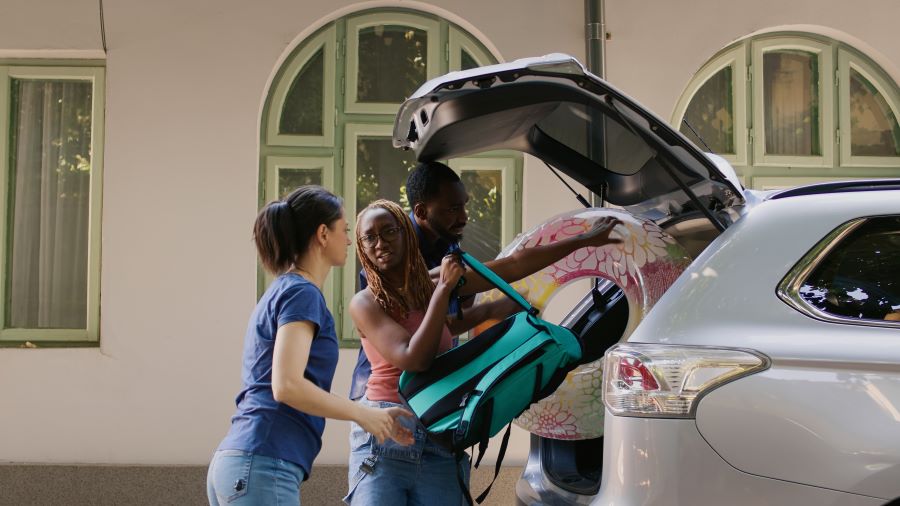7 Crore+ Customers

Affordable Premium


What are the Things to Bring for a Road Trip?

Setting off on a road trip is super exciting! It's like a big adventure where you explore new destinations and have fun with your friends or family.
However, proper preparation is important to ensure a smooth and enjoyable journey. One of the most crucial aspects of road trip planning is packing. Knowing what things to bring for a road trip can significantly impact your overall experience.

Table of Contents

What Kind of a Bag Should I Carry for a Road Trip?
When selecting the ideal bag for your road trip, versatility, durability, and capacity are key considerations; here are a few options to consider:
- Duffle Bag: Versatile and spacious, duffle bags offer ample room for clothing and essentials. Choose one with multiple compartments for easy organisation.
- Rucksack: Perfect for outdoor enthusiasts, it provides comfort and mobility, making it suitable for hiking or camping detours.
- Toiletry Bag: Keep your toiletries neatly organised and easily accessible with a dedicated toiletry bag, preferably one with compartments to prevent leaks.
- Airtight & Waterproof Bag: This bag protects against moisture and other elements to safeguard valuables and electronic devices.
How to Organise The Bags?

Efficient organisation is key to a stress-free road trip, ensuring that everything you need is within reach without rummaging through your luggage; here are some organisation tips:
- Separate Bag for Food Items: Keep perishable and non-perishable food items in separate bags to prevent contamination and ensure freshness.
- Separate Bag for Footwear: To avoid soiling clothing and other belongings, stow muddy or bulky footwear in a designated bag.
- Separate Bag for Swimwear: Pack swimwear separately to facilitate spontaneous stops at lakes or pools along your route.
- Overnight Bag Per Person: Prepare an overnight bag for each traveller containing essentials like pyjamas, toiletries, and a change of clothes.
- Handbag Per Person: Encourage each traveller to carry a small handbag or backpack for personal items such as snacks, water, and entertainment.
- Pack Larger Items First: Utilise the available space efficiently by prioritising larger items before filling in with smaller ones.
How Do You Load the Luggage in the Vehicle?

Properly loading your luggage in the vehicle ensures safety, comfort, and optimal space utilisation; here are some loading tips:
- Follow the First in Last Out Rule: Arrange your luggage so that items you'll need first are easily accessible upon arrival.
- Don't Overload: Avoid overloading your vehicle with excess baggage, affecting fuel efficiency, stability, and handling.
- Don't Block Windows: Maintain clear visibility by avoiding obstructing windows for drivers with oversized items or bulky luggage.
- Weight Distribution: Distribute weight evenly throughout the vehicle to prevent imbalance and improve stability and performance.
- Secure the Load: Use straps or bungee cords to secure luggage and prevent shifting while driving; this will safeguard the passengers.
- Use Roof Racks: Utilise roof racks for bulky items such as bicycles, kayaks, or additional luggage. This will free up the interior space of the car.
- Use Fasteners: Secure loose items inside the vehicle with fasteners or storage nets to prevent them from becoming dangerous during sudden stops.
What All Should I Keep in My Handbag?
A well-packed handbag is essential for keeping your most important items within arm's reach throughout the trip; here’s the list:
- Necessary Documents: Includes ID, driving licence, and travel insurance.
- Money/Cards: Ensures you have access to funds.
- Skincare: Protects against the elements.
- Sanitiser: Maintains hygiene.
- Pocket Knife: Useful for minor repairs or emergencies.
- Mobile Phone: For navigation and communication.
- Car Key: Keep separate from luggage for easy access.
- First Aid Kit: For small injuries and emergencies.
- Sunglasses: Protect against glare.
- Tissues & Wipes: For cleanliness and spills.
- Drinking Water: Stays hydrated.
What All Should I Pack?
Your packing list for a road trip should be comprehensive yet not overly bulky, covering essentials for comfort, entertainment, and emergencies:
- Snacks: Keep hunger at bay with easy-to-eat, non-perishable snacks.
- Meals: Plan for meal stops or pack meals if travelling through remote areas.
- Weather Accessories: Be prepared for any weather with appropriate gear.
- Clothes: Pack versatile layers for changing conditions.
- Swimwear: Don’t forget swimwear for impromptu dips.
- Footwear: Comfortable shoes for driving and any planned activities.
- Toiletries: Personal hygiene essentials.
- Travel Pillow: For comfort during rests and overnight stops.
- Emergency Kit: Includes tools and supplies for vehicle troubles.
- Reusable Water Bottle: Stay environmentally conscious and hydrated.
- Headphones: For personal entertainment without disturbing others.
- Bug Spray: Keep pesky insects at bay.
- Garbage Bags: Keep your vehicle clean and organised.
- Vehicle Accessories: Spare tyres, jumper cables, and other essentials.
- Flashlight: For visibility during nighttime stops or emergencies.
- Chargers: Keep all devices powered up.
- Frisbee & Playing Cards: Fun things to bring on a road trip for entertainment.
What to Avoid Packing?
Packing for a road trip requires careful consideration to ensure you have everything you need without overloading your car. It's important to avoid packing unnecessary items that can take up valuable space and add weight to your car. Here are some things to avoid packing for a road trip:
- Bulky Items: Avoid bringing large, bulky items that occupy much space. This includes things like oversized suitcases and large coolers.
- Excessive Clothing: Pack only what you need. Avoid overpacking clothes by planning outfits that can be mixed and matched.
- Too Many Gadgets: Avoid packing multiple gadgets with similar functions, such as bringing both a tablet and a laptop when one will suffice.
- Heavy Books: Instead of packing heavy books, opt for digital versions on an e-reader or a tablet. This saves space and reduces weight.
- Perishable Food: Avoid packing food that spoils quickly or requires refrigeration unless you have a reliable cooler.
- Unnecessary Valuables: To reduce the risk of loss or theft, leave expensive jewellery, excessive cash, and other valuables at home.
- Duplicate Items: Avoid packing items easily accessible on the road, such as toiletries and snacks, which you can buy as needed.
- Too Many Shoes: Limit the number of shoes you pack. Choose versatile footwear that works for multiple activities, like comfortable walking shoes and sandals.
A successful road trip begins with thorough planning and strategic packing. Remember, the things to bring on a road trip extend beyond mere necessities; they're about enhancing the overall experience, ensuring you’re prepared for every adventure that comes your way.













